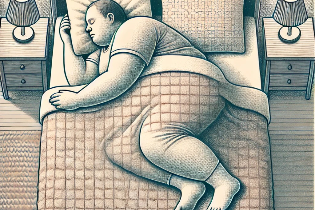How Obesity Affects Sleep
Obstructive Sleep Apnea (OSA)
One of the most common and serious sleep disorders associated with obesity is obstructive sleep apnea (OSA). OSA occurs when the airway becomes partially or completely blocked during sleep, leading to repeated interruptions in breathing. These pauses in breathing can last from a few seconds to a minute and may occur hundreds of times during the night, disrupting sleep.
In obese individuals, excess fat around the neck and throat can cause the airway to narrow or collapse during sleep. This makes it harder for air to pass through, resulting in loud snoring and breathing difficulties.
Effects of OSA on Health:
- Daytime fatigue
- Impaired cognitive function and memory
- Increased risk of high blood pressure, heart disease, and stroke
- Greater risk of developing type 2 diabetes
2. Lower Sleep Quality
Obesity can lead to lower sleep quality even in the absence of sleep apnea. Excess body weight can cause discomfort during sleep, making it difficult to find a comfortable position. Obese individuals are more likely to experience frequent awakenings during the night, reducing the overall quality and restorative nature of their sleep.
3. Gastroesophageal Reflux Disease (GERD)
Obesity is a major risk factor for gastroesophageal reflux disease (GERD), a condition in which stomach acid frequently flows back into the esophagus, causing heartburn. GERD is often worse at night, as lying down can make it easier for acid to flow back up. The discomfort from heartburn and acid reflux can lead to frequent awakenings and poor sleep quality.
4. Increased Risk of Insomnia
Insomnia, characterized by difficulty falling or staying asleep, is more common in people with obesity. Physical discomfort from excess weight, metabolic imbalances, and chronic inflammation can all contribute to the inability to sleep soundly through the night. Additionally, anxiety or depression, both of which are more prevalent in people with obesity, can also lead to insomnia.
5. Restless Leg Syndrome (RLS)
Restless Leg Syndrome (RLS) is a condition that causes uncomfortable sensations in the legs and an irresistible urge to move them, often occurring at night. Obesity has been linked to a higher risk of RLS, and this disorder can significantly disrupt sleep.
The Role of Poor Sleep in Obesity
Just as obesity can negatively impact sleep, poor sleep can also contribute to weight gain, creating a vicious cycle. Here’s how:
- Hormonal Imbalances
Sleep deprivation affects hormones that regulate hunger, such as ghrelin and leptin. Ghrelin, the “hunger hormone,” increases appetite, while leptin, the hormone that signals fullness, decreases. When sleep is insufficient, ghrelin levels rise and leptin levels drop, leading to increased hunger and cravings, particularly for high-calorie, high-carbohydrate foods.
2. Metabolic Slowdown
Lack of sleep can slow down the metabolism, making it more difficult for the body to burn calories efficiently. Studies have shown that sleep-deprived individuals tend to burn fewer calories at rest compared to those who get enough sleep.
3. Increased Fat Storage
Sleep deprivation has been linked to increased fat storage, particularly around the abdominal area. This type of fat, known as visceral fat, is especially dangerous because it surrounds vital organs and contributes to an increased risk of metabolic diseases.
4. Decreased Physical Activity
Poor sleep leads to daytime fatigue, which often results in reduced physical activity. When a person is tired, they are less likely to engage in exercise, which further contributes to weight gain.
Solutions to Improve Sleep Health in People with Obesity
- Weight Loss
Losing weight, even a modest amount, can significantly improve sleep quality. In particular, weight loss can reduce the risk or severity of obstructive sleep apnea and lower the likelihood of other sleep-related disorders. Weight loss can also reduce pressure on joints, making sleep more comfortable.
2.Treatment for Sleep Apnea
If you suspect sleep apnea, it’s essential to get a proper diagnosis and treatment. Continuous Positive Airway Pressure (CPAP) therapy is a common and effective treatment for OSA. The CPAP machine delivers a steady stream of air to keep the airway open during sleep, reducing interruptions in breathing.
3. Healthy Sleep Habits
Adopting healthy sleep hygiene practices can help improve sleep quality:
- Stick to a consistent sleep schedule, going to bed and waking up at the same time each day.
- Create a comfortable sleep environment, free from distractions and noise.
- Avoid heavy meals, alcohol, and caffeine close to bedtime.
4. Physical Activity
Regular exercise can promote better sleep by helping to regulate the body’s circadian rhythm. Physical activity also promotes weight loss, which can improve overall sleep health. Just be sure to avoid vigorous exercise right before bed, as this can interfere with sleep.
5. Dietary Changes
A healthy diet can promote better sleep and weight loss. Reducing the intake of processed, high-calorie foods and increasing the consumption of fruits, vegetables, lean proteins, and whole grains can support both weight management and sleep quality.
Conclusion
Obesity and poor sleep are interconnected, with each condition negatively influencing the other. Addressing obesity through weight loss, proper sleep treatments, and lifestyle changes can significantly improve sleep quality and overall health. Taking steps to prioritize both your sleep and your weight can break the cycle and lead to better health outcomes in the long run.

